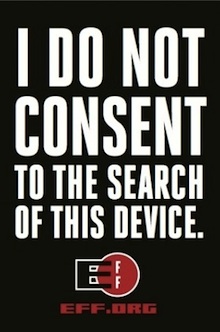If security wants your password: Privacy for travelers with digital devices

Traveling for the holidays is a good reason to familiarize yourself with protecting your privacy and data while traveling with digital devices, and knowing what security agents can - and can't - do to your devices when you travel.

Anyone who travels with laptops, phones and tablets should know what to do if security asks for their password, an agent asks to see what's on their phone, and how to protect sensitive or private information if their gadget gets out of their hands.
For instance, while traveling inside the U.S. border, it's important to know that the TSA isn't supposed to confiscate laptops, search digital devices or demand passwords.
On the TSA blog, they write (NOTE: TSA blog link was removed and TSA pointed me to this link):
TSA does not and will not confiscate laptops or other electronic devices at our checkpoints.
(...) Should anyone at a TSA checkpoint attempt to confiscate your laptop or gain your passwords or other information, please ask to see a supervisor or screening manager immediately.
However, the TSA has been working with the Department of Homeland Security on a secretive watchlist program called Secure Flight - those people who have been covertly put on "enhanced screening" and "No Fly" lists.
Traveling abroad is where egregious digital privacy invasions occur: U.S. border agents can legally search your laptop or other digital device and copy the contents, as well as confiscate devices.
Border agents can do all of this without suspicion or a warrant. And in my opinion, it shouldn't be allowable.
The EFF has been fighting these serious violations of privacy for years, and have put together a few excellent primers on your rights, making backups and encryption, passwords, deciding when and how to fight agent demands, and what to expect if your device gets confiscated.
Even if you think you're not a troublemaker, or don't have anything interesting enough for agents to care about, you should think twice about letting agents search your digital device.
Do you really want strangers looking at your personal communications, photos, business plans or information, contact information for loved ones... and if they copy it, how do you know their database won't get hacked?
Protecting your digital privacy from search without oversight or accountability from authorities isn't just reasonable, it's becoming necessary.
The EFF has a few excellent posts you need to read before you pack.
A crucial and detailed guide is Defending Privacy at the U.S. Border: A Guide for Travelers Carrying Digital Devices.
In it, learn from the EFF about basic precautions, how the government searches devices, how (and when) to protect your data, encryption and good passwords, border agent demands, and more.
On the EFF's Travel Screening page, they cover the basics on border search, and travel 'blacklists' such as the Department of Homeland Security's Automated Targeting System.
- See also: Defending Privacy at the Israeli Border: Information for Travelers Carrying Digital Devices (eff.org)
- Supplemental, regarding American police and digital devices: Know Your Rights (eff.org)
Post image: "I do not consent to the search of this device" sticker, from the EFF shop. A great stocking stuffer!